ACCESS TO ENERGY PROJECT
To facilitate access to alternative and affordable off-grid energy solutions for rural enterprises and households, using a sustainability delivery model that ensures long-term viability for investors and which boosts local demand for energy services.
With an estimated 60-70% of communities in the Niger Delta off-grid or lacking frequent supply of reliable electricity, PIND:
- Engages with private sector actors, community leaders and stakeholders in unserved coastal parts of the region to learn about the opportunities and advantages in energy cabin solar solution for coastal communities.
- Promote and when necessary co-create beneficial products and services that communities desire to buy and businesses would want to sell, especially those that revolve around Energy Technologies, Training, and Services.
- Partner and contribute resources to implement a private sector-led business model of the energy cabin solution.
SUCCESS STORIES
Beneficiaries of PIND’s Access to Energy interventions in the Niger Delta are: Micro, Small and Medium Enterprises, women and children, farming settlements, fishing camps and communities, businesses and trade associations, and households in coastal areas.
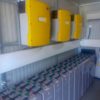
Through a similar community-centred energy-in-a-box solution, PIND also collaborated with Vectis Business Options limited to retrofit the solar refrigeration units at Sangana and Fishtown communities, and also provide businesses services by selling the service to fisherfolks and households within these communities; operate and maintain the solar refrigeration units
By this intervention, over 250 fisherfolks within Sangana and Fishtown communities have had improved access to energy for refrigeration.
read more
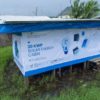
To support the wide uptake of the technology solutions by identifying, engaging and training the workforce for operating and maintaining the Energy Cabin and Solar refrigerating units as a hub, as well as community based entrepreneurs and stewards that will market the solar renewable solutions in Ogheye, Sangana and Fishtown communities.
PIND through partnership with Vectis Business Options limited deployed a 20kWp Solar PV energy cabin in Ogheye, community, Delta State, as a pilot that demonstrates the commercial viability of the Energy cabin as an A2E solution for coastal communities in the Niger Delta.
Through this collaboration, several MSME’s and households in Ogheye community have secured access to electricity, including within sectors with a wide participation of women and youth, as well as wide reaching livelihood areas such as fish preservation, mobile phone charging, and retail.
read more

My Name is Tari Jackson. I have been living in Fish Town since 2002. And, in 2003, I started the fish drying business, which we send to Yenagoa. We are always drying fish every day. So, when we heard that there is a cold room here in Fish Town and this is really going to help us a lot because sometimes our fishes get spoiled because there is no firewood to keep it from getting spoiled and as a result of that, we lose a lot of money. So, with the availability of the cold room, we can easily rush to the cold room to preserve the fishes and bring them out the following morning to dry them, or we can just send them to Yenagoa. As for me, I like this cold room more than the fish I am drying locally. Because if I put them in the cold room, I won’t have to buy firewood anymore. This firewood I buy with money, I wouldn’t have to buy anymore.
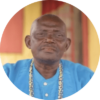
‘’My name is Pa Malo Felix, the Olaja of Ogheye community. This solar that came to this Ogheye community, we love it, and we are enjoying it. Before the solar came, we had generators in this community, but due to the condition of fuel, we haven’t been able to power the generator. In that case, as the solar came, we had to accept the solar, and it is okay with us. We used to have problems of diesel, but with the solar, we don’t need the diesel anymore. Solar is with us and what we do is to recharge the solar. And after you have recharged your solar, everything will be okay with you. We love the solar here a lot, and we would want the solar to stay. So, I thank the people that have brought this solar to the community.”
read more

‘’My name is Steven Idikunle. I am the owner of Philipcom Hotel. About a few months ago, we acquired solar electricity that we are using. And the solar light is helping a lot. Before now, we were using a generator, and we burnt a lot of fuel as a result of that. Normally, we did repair the generator, but for some time now, that has gone away. I used to use about two (2) refrigerators before, but now, I use about three (3) now. And all my systems are working very fine now.”
read more
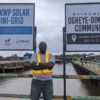
‘’My name is Kehinde Emmanuel Tayo, CEO of Vectis Business Option, a company built on the promises of renewable energy to bring power to the people of this great country. Our quest to solve energy challenges has brought us into the mini-grid-energy space to provide power for the people in the underserved and unserved communities of rural communities in Nigeria. Our partnership with PIND has brought about this relationship where we are able to reach out to more communities in the coastal region to provide them energy access to power. We are very grateful to PIND for what they have done, making our lives easy, making things easy in terms of access to communities, and then, supporting in reaching out to these communities in the Niger Delta.’’
read more
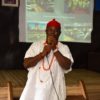
“Now that we have solar power, the amount of noise pollution by generators is reduced. Situations where you want to sleep but can’t because of the noise from your neighbors’ generator, that doesn’t happen anymore… it has been a long time we have seen something like this …we don’t see such often here so we are happy and grateful.”
read more

Before the mini-grid was installed in our community, we had never had access to electricity. If we needed to charge our phones, we would have to go to neighboring communities or seek help from neighbors who could afford generators. Now, every home has a daily supply of electricity. We have power throughout the day, and then the mini grid goes off at about 3 am to enable the batteries to fully recharge before it is turned on again at 6 am.
Those charging their phones in other communities can now do so in their homes. People no longer need to rely solely on their generators for electricity supply in their homes and businesses. I thank PIND for this opportunity and Mr. Francis Owieadolor, CEO, of Oghosa Limited, for accepting to come to our community. Most of the riverine areas around us need access to electricity, which has always been challenging. This opportunity has opened up Adagbarasa Community, and neighboring communities would like to benefit from the project
read more

Before meeting PIND, I had been running a renewable energy company for more than seven years, where we install solar panels and sell other renewable energy products. I learned about PIND in 2022 through the Renewable Energy Service Providers Association of Nigeria (RESPAN). Then I attended one of PIND’s Access to Energy model sharing workshops in Port Harcourt. Although I had heard about mini-grids before the workshop, I had been skeptical about exploring them as a business opportunity as I was worried about the security risks.
PIND promised to facilitate and bridge the gap of community engagement with the people. I also networked and had one-on-one conversations with other renewable energy investors who had worked with PIND on similar projects. In June, PIND took me on an assessment tour of Adagbarasa, Warri North LGA of Delta state, to learn the community’s energy needs and viability as a mini-grid installation location. It was the first time I had gone to a community by water. With PIND facilitating the engagement, I had no issues interfacing with the people. I was particularly encouraged by their excitement towards the project. Like most coastal communities, they were off the national grid, so they saw the opportunity to access a low-cost and sustainable source of electricity. It was then I saw the actual value and impact of the mini grid.
After the assessment, I reached out to another organization that had promised to support me with some of the materials for the grid. However, they declined to help because they deemed the community too small, and the project less economically viable than initially hoped. I was discouraged because it was new terrain for me business-wise, and these people who had been in the sector didn’t think it was worth it. However, after some deliberation and considering the impact on the lives of the people, I decided to continue on my own and use the experience as a learning process. I reached out to PIND once more, expressed my concerns, and told them the areas I would need support. I also spoke about the issue of access to the community seeing that you could only reach it by water, and we would need to move heavy equipment there to install the cabin.
We also spoke about funding and management of the grid after installation and my lack of experience in the sector. PIND stepped in, and their support exceeded my expectations. Based on my proposal, PIND awarded me a grant that covered the materials needed to install the grid. Since meeting PIND, my organization’s confidence level, skills, and experience have improved. Going into the mini-grid sector has improved our capacity and given us access to an industry we would have never believed we could enter. Another value to the organization is that we have improved our business structure to accommodate this new expansion in the energy sector. Already, we have seen even more opportunities to explore.
read more


